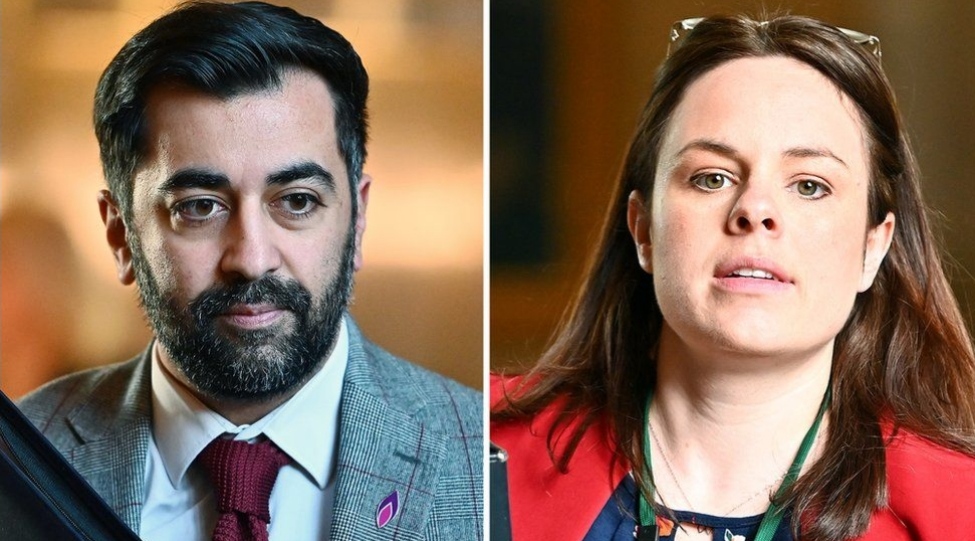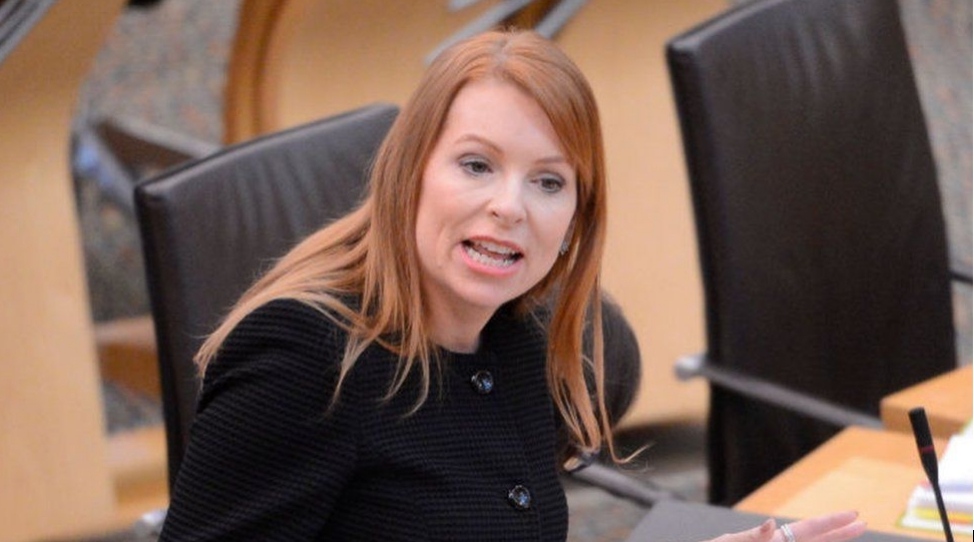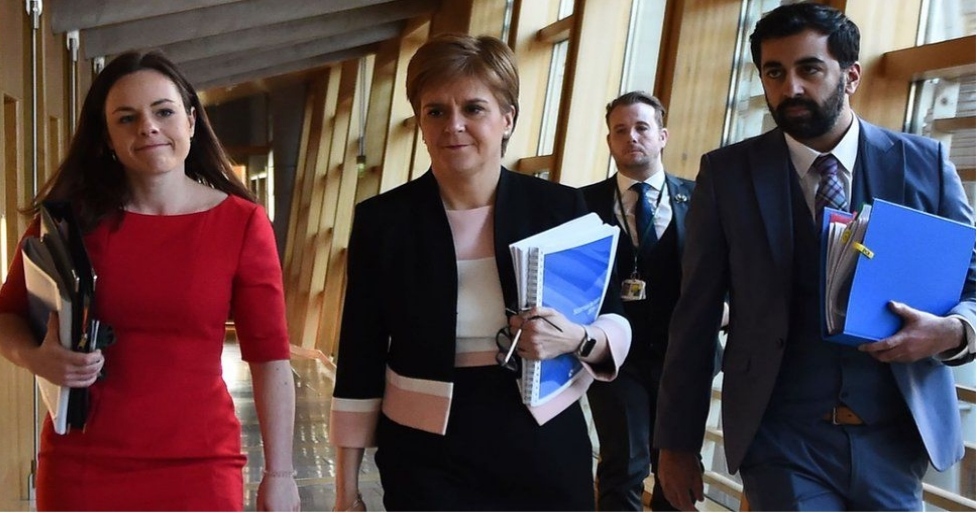SNP leadership : Will faith turn the tide for Scottish independence?

Humza Yousaf and Kate Forbes are leading candidates to be the next first minister
By James Cook
Nothing lasts forever. That is true in politics as it is in life.
As they wash ashore, some political tides reshape the landscape before, eventually, they recede again.
Are we at such a moment? Is this the turning of the tide for the Scottish National Party and its campaign to end the 316-year old union between Scotland and England?
The answer to that question may lie with one of three people: Humza Yousaf, Kate Forbes or Ash Regan, all of whom are vying to take over from Nicola Sturgeon as SNP leader and Scotland’s First Minister.
Ms Regan has not yet been available for interviews but on Monday I sat down with two frontrunners, Ms Forbes and Mr Yousaf.
What did we learn? Actually a surprising amount.
Kate Forbes told me that she would not have backed the Scottish government’s controversial bill designed to make it easier to legally change gender.
We had guessed that this was probably her view but this was the first on-the-record confirmation.
“I would not have been able to vote for the principle of self-ID,” the MSP for Skye, Lochaber and Badenoch, who is taking a break from her maternity leave to launch the campaign, told me.
Media caption,
Kate Forbes says she was “extraordinarily torn” about whether to stand as first minister
Her fellow contender, Ash Regan resigned as community safety minister to oppose the bill and, had the vote not fallen during Ms Forbes’ leave, the finance secretary would surely have had to do the same.
“That would have been a decision that I’d have had to take in discussion with colleagues,” she said.
At the heart of Ms Forbes’ identity is her membership of the socially conservative Free Church of Scotland, whose evangelical ministers broke away from the Church of Scotland in 1843.
She told me that a “significant glare of scrutiny” on her in this regard was fair enough but, she added, “I think we get into very dangerous territory when we say that certain public offices are barred to certain minority groups.”
“I’m talking to you as somebody who has a Christian faith. I’ve never kept that a secret,” she went on.
“But I would like to ask in the last six years, when have I ever imposed that on other people?”
Votes of conscience
There has indeed been a lot of discussion about Ms Forbes’ faith but rather less about Mr Yousaf’s.
He describes himself as a proud Muslim who will be fasting during Ramadan, which falls in the final week of the short leadership campaign.
I asked him why he thought there had been more focus on Christianity than Islam, thus far.
“I don’t legislate on the basis of my faith,” he replied, adding that he had a track record of supporting gender reform, gay marriage and buffer zones around abortion clinics.
Ms Forbes insisted that she did not legislate on the basis of her faith either, favouring votes of conscience on some social issues, where an individual can put aside party allegiance to cast a ballot on the basis of their morals, without political repercussions.
She too gave the example of gay marriage. As a Christian, she explained, she believed marriage to be between a man and a women but she insisted she would defend the law as “a servant of democracy.”
Her position was no different, she insisted, to that of the former German chancellor Angela Merkel, who voted against same-sex marriage in her homeland, or many other Christian, Muslim or Jewish worshippers.
“As a servant of democracy in a country where this is law, I would defend to the hilt your right, and anybody else’s right, to live and to love without harassment or fear,” she said.
Media caption,
Humza Yousaf says his experience in government is a key asset in his bid to become first minister.
So both leading candidates are people of faith but both insist they are democrats too.
On how to handle the issue of gender though there is a sharp difference between the pair.
The Gender Recognition Reform Bill passed by Holyrood just before Christmas is in limbo, blocked by the UK government from receiving royal assent under Section 35 of the Scotland Act 1998 which established the framework of devolution, on the basis that it interferes with equalities law which applies throughout Great Britain.
Mr Yousaf said that, like Ms Sturgeon, he favoured challenging that decision by seeking a judicial review of it at the Court of Session in Edinburgh.
Ms Forbes, on the other hand, dismissed such an approach.
“My polling as it were is based on conversations with normal, ordinary people over the last seven months and to a person they say ‘focus on the NHS, focus on the cost of living crisis, and focus on making the case for independence.’ That I think is more of a priority than legal cases so I would be loath to challenge it,” she explained.
Opponents of the principle of gender self-identification, which lies at the heart of the bill, say they have been vindicated by the case of Isla Bryson, the double rapist who opted to change gender from male to female after being charged.
That’s a thorny issue for Mr Yousaf who, perhaps inadvertently, highlighted a problem with existing gender law, which he supports.
“Isla Bryson, by law, has the right to self-identify, that’s the law even before the gender recognition reform even was discussed in parliament,” he said.
However, he added: “I don’t think they’re a genuine trans person at all. I think they’re doing it for their own selfish, dishonest, despicable reasons.”
Pushed, he said he was happy to refer to Bryson as “he” not “they”.

Ash Regan has also thrown her hat into the ring in the leadership race
The SNP has been in power at Holyrood for 16 years. All governments tire and this one is no exception. There is no shortage of problems for an incoming leader to tackle.
Excess deaths remain stubbornly high even as memories of the pandemic recede. Waiting times and staff shortages are causing misery in the NHS. Drugs deaths have been at or near record levels in recent years. Ms Sturgeon failed in her own “defining mission” to close the attainment gap between the richest and the poorest school pupils.
Both leading candidates insist they would bring fresh energy to tackling these deep, difficult problems.
“We need to focus on our priorities and we need to focus on delivery,” said Ms Forbes.
“I’ve got the experience,” said Mr Yousaf, who held the transport and justice briefs before becoming health secretary.
Internal opposition
The new leader must also wrestle with restlessness in their party — and in the wider independence movement — about independence.
The current first minister had struggled to map a path to that destination, having been thwarted by Westminster’s refusal to approve a second referendum and by the UK Supreme Court’s ruling that Holyrood could not hold one itself.
Ms Sturgeon’s final, failed throw of the dice was to try to reframe the next general election as a referendum in all but name.
Internal opposition to that plan appears to have been a significant factor in her resignation, and both Ms Forbes and Mr Yousaf are now backing away from it.
“I have to say I’m not wedded to that view,” says the MSP for Glasgow Pollok, diplomatically, pointing out “disadvantages” with the strategy such as the fact that, unlike in the 2014 referendum, the franchise would not include 16 and 17 year olds or European citizens.
Mr Yousaf called for further party discussion on tactics, adding: “We have to be honest about it because if anybody is cooking up a plan that isn’t going to work, isn’t based in reality, then I think we’ve got to just give that short shrift. “

Focus on building the case for independence until it was clearly the “settled will of the Scottish people” and the mechanism by which it would be achieved would become clear, he argued.
Ms Forbes appeared to agree but she also stressed that independence could only be won through providing economic growth, rooted in thriving industries and a fair deal for workers.
“Competent government” and “competent leadership” were, she said, key to achieving these aims.
“Ultimately, the only way that we are going to secure independence is when the people of Scotland, by a significant percentage, want independence,” added Ms Forbes.
Both candidates are youthful — Mr Yousaf is 37 and Ms Forbes is 32 but the government which they serve is old, in democratic terms at least.
Either one would be the youngest leader in the devolution era, which began when the Scottish Parliament opened in Edinburgh in 1999.
The previous record-holder, Labour’s Jack McConnell, was 41 when he took office in 2001.
Lord McConnell’s party is watching this contest closely, sensing an opportunity to recover some ground lost in the aftermath of the 2014 referendum when Labour won the day on the constitution only to watch hordes of its voters then defect to Ms Sturgeon’s SNP.
Still, Labour’s dominance in Scottish politics lasted for half a century. The SNP is 16 years into its hegemony.
That’s a long time in politics but not long enough to tell, yet, if the tide has indeed turned.




